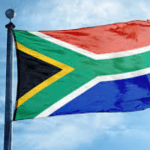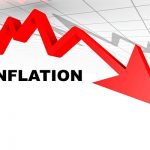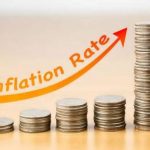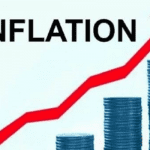Nigeria’s annual inflation is back on the rise accelerating for the fourth straight month to 17.71 percent in May.
This latest figure has shown the steepest inflation rate since last June, fueled by rising food prices, soaring diesel prices, and ongoing dollar shortages.
As a result of this, Nigeria’s economic outlook at this period in time remains threatened by disruptive power outages, foreign exchange shortages, capital outflows, and untamed inflation, and if not well managed economists say will lead the country into another recession.
While other oil-producing countries are enjoying the gift of soaring commodities, Nigeria has failed to cash with no thanks to sub-optimal oil production, heavy reliance on gasoline imports, and fuel subsidies, a development that has continued to worsen dollar scarcity in the country.
Nigeria’s annual inflation is back on the rise accelerating for the fourth straight month to 17.71 percent in May.
This latest figure has shown the steepest inflation rate since last June, fueled by rising food prices, soaring diesel prices, and ongoing dollar shortages.
As a result of this, Nigeria’s economic outlook at this period in time remains threatened by disruptive power outages, foreign exchange shortages, capital outflows, and untamed inflation, and if not well managed economists say will lead the country into another recession.
While other oil-producing countries are enjoying the gift of soaring commodities, Nigeria has failed to cash with no thanks to sub-optimal oil production, heavy reliance on gasoline imports, and fuel subsidies, a development that has continued to worsen dollar scarcity in the country.
Nigeria’s annual inflation is back on the rise accelerating for the fourth straight month to 17.71 percent in May.
This latest figure has shown the steepest inflation rate since last June, fueled by rising food prices, soaring diesel prices, and ongoing dollar shortages.
As a result of this, Nigeria’s economic outlook at this period in time remains threatened by disruptive power outages, foreign exchange shortages, capital outflows, and untamed inflation, and if not well managed economists say will lead the country into another recession.
While other oil-producing countries are enjoying the gift of soaring commodities, Nigeria has failed to cash with no thanks to sub-optimal oil production, heavy reliance on gasoline imports, and fuel subsidies, a development that has continued to worsen dollar scarcity in the country.
Nigeria’s annual inflation is back on the rise accelerating for the fourth straight month to 17.71 percent in May.
This latest figure has shown the steepest inflation rate since last June, fueled by rising food prices, soaring diesel prices, and ongoing dollar shortages.
As a result of this, Nigeria’s economic outlook at this period in time remains threatened by disruptive power outages, foreign exchange shortages, capital outflows, and untamed inflation, and if not well managed economists say will lead the country into another recession.
While other oil-producing countries are enjoying the gift of soaring commodities, Nigeria has failed to cash with no thanks to sub-optimal oil production, heavy reliance on gasoline imports, and fuel subsidies, a development that has continued to worsen dollar scarcity in the country.
Nigeria’s annual inflation is back on the rise accelerating for the fourth straight month to 17.71 percent in May.
This latest figure has shown the steepest inflation rate since last June, fueled by rising food prices, soaring diesel prices, and ongoing dollar shortages.
As a result of this, Nigeria’s economic outlook at this period in time remains threatened by disruptive power outages, foreign exchange shortages, capital outflows, and untamed inflation, and if not well managed economists say will lead the country into another recession.
While other oil-producing countries are enjoying the gift of soaring commodities, Nigeria has failed to cash with no thanks to sub-optimal oil production, heavy reliance on gasoline imports, and fuel subsidies, a development that has continued to worsen dollar scarcity in the country.
Nigeria’s annual inflation is back on the rise accelerating for the fourth straight month to 17.71 percent in May.
This latest figure has shown the steepest inflation rate since last June, fueled by rising food prices, soaring diesel prices, and ongoing dollar shortages.
As a result of this, Nigeria’s economic outlook at this period in time remains threatened by disruptive power outages, foreign exchange shortages, capital outflows, and untamed inflation, and if not well managed economists say will lead the country into another recession.
While other oil-producing countries are enjoying the gift of soaring commodities, Nigeria has failed to cash with no thanks to sub-optimal oil production, heavy reliance on gasoline imports, and fuel subsidies, a development that has continued to worsen dollar scarcity in the country.
Nigeria’s annual inflation is back on the rise accelerating for the fourth straight month to 17.71 percent in May.
This latest figure has shown the steepest inflation rate since last June, fueled by rising food prices, soaring diesel prices, and ongoing dollar shortages.
As a result of this, Nigeria’s economic outlook at this period in time remains threatened by disruptive power outages, foreign exchange shortages, capital outflows, and untamed inflation, and if not well managed economists say will lead the country into another recession.
While other oil-producing countries are enjoying the gift of soaring commodities, Nigeria has failed to cash with no thanks to sub-optimal oil production, heavy reliance on gasoline imports, and fuel subsidies, a development that has continued to worsen dollar scarcity in the country.
Nigeria’s annual inflation is back on the rise accelerating for the fourth straight month to 17.71 percent in May.
This latest figure has shown the steepest inflation rate since last June, fueled by rising food prices, soaring diesel prices, and ongoing dollar shortages.
As a result of this, Nigeria’s economic outlook at this period in time remains threatened by disruptive power outages, foreign exchange shortages, capital outflows, and untamed inflation, and if not well managed economists say will lead the country into another recession.
While other oil-producing countries are enjoying the gift of soaring commodities, Nigeria has failed to cash with no thanks to sub-optimal oil production, heavy reliance on gasoline imports, and fuel subsidies, a development that has continued to worsen dollar scarcity in the country.











